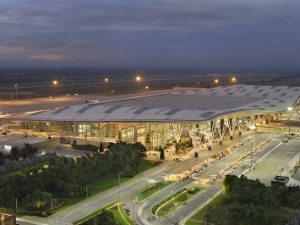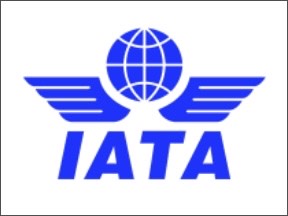Jawaharlal Nehru Port Authority (JNPA), India’s premier container port, announced that it has undertaken multiple projects aligning with the PM’s initiative of ‘Gati Shakti.’ JNPA highlighted the progress and the outcome of these developmental projects in line with PM Gati Shakti- National Master Plan for multi-modal connectivity. Sanjay Sethi, IAS, Chairman, JNPA, led the briefing event in the presence of senior officials from Railways, Customs, PSA Mumbai, IPRCL, NHAI key and JNPT Hods. The briefing event was virtually attended by various key participants from the Central & State Ministries. PM Gati Shakti aims to reduce logistics costs, develop world-class infrastructure to make EXIM efficient, and benefit citizens by saving cost and time and fastening the pace of development in the country. It will play a major role in the integrated economic growth of the country. It is based on seven engines of growth – roads, railways, airports, ports, mass transport, waterways, and logistics. Stressing on JNPA’s projects and its features contributing towards the aim of Gati Shakti, Sanjay Sethi, IAS, Chairman, JNPA stated, “The projects like JNPA-SEZ, Fourth Container Terminal, additional Liquid Cargo Jetty, etc. will be a catalyst for port-based industrialization in India and make the EXIM trade even more efficient with ease of operation. JNPA is the leading port in the country that provides state of the art facilities. These projects under Gati Shakti will contribute to all-inclusive progress and development of the nation.” Aligned with the PM Gati Shakti – National Master Plan, JNPA has undertaken various projects like Coastal Berth, JNPA SEZ, Centralized Parking Plaza, Fourth Container Terminal, Road Widening, Dry Port at Wardha & Jalna, Berthing facility for ROPAX/RORO, Common Railyard, Additional Liquid Cargo Jetty …
Read More »Tata Steel transports finished steel in LNG-fuelled trailers in India
Tata Steel flagged-off its first batch of liquefied natural gas (LNG) powered vehicles to transport its finished steel products at a function in Nagpur on March 5, 2022. This initiative by Tata Steel is part of its ongoing efforts towards a carbon-neutral future. Under the guidance of Tata Steel’s logistics department, its vendor partners Ashmi Logistics and Shreyas Associates deployed two vehicles each for local movement of the products in Nagpur. The vehicles aim to ferry around 1,000 metric tonnes of product. LNG vehicles don’t emit sulphur dioxide and their NOx and greenhouse gas emissions are up to 85% lesser than vehicles that run on other fuels. Over the last three decades, Tata Steel has made concerted efforts in various areas, including supply chain, to mitigate climate change and manage associated risks. Tata Steel launched its Responsible Supply Chain Policy in FY20 which specifies “Environmental Protection” as an integral sustainability principle for all its supply chain decisions and processes. In February this year, Tata Steel became the first Indian steelmaker to transport goods using inland waterways from the Haldia Port in West Bengal to Pandu Port in Assam, reiterating its commitment to building a sustainable future. In July 2021, the Company pioneered the use of electric vehicles to move finished goods from its erstwhile Tata Steel BSL’s Sahibabad Plant and Pilkhuwa Stockyard in Uttar Pradesh. Tata Steel also became the first steel producer in the world to join the Sea Cargo Charter to reduce ‘Scope 3’ greenhouse gas emissions in ocean trade last year. The Company has been rated “A” and is listed as 2021 ‘Supplier Engagement Leader’ by CDP, a global environmental non-profit charity, for its initiatives to reduce …
Read More »MoD allocates land to Pune Airport for cargo operations
Earlier this week, the Ministry of Defence (MoD) announced that a 13 acre defence land parcel will be allotted to the Airports Authority of India (AAI) for Pune International Airport. The airport currently has only 500 sq ft of space for its cargo operations. The land parcel will be given from the BSO yard and the CWE office, and will include a 2.5 acre land parcel allotted earlier. The decision comes at the right time considering that India will soon resume its scheduled international flights. We have received a letter from the MoD and now, a committee will be formed. The committee will check the inventory of the defence land which is going to be handed over so that the same type of inventory can be allotted to another land before the handover takes place.” said, Santosh Dhoke, Director, Pune International Airport The currently limited space occupied by the Airport for cargo services limits its international as well as domestic cargo operations, putting it far below the other airports in India. The Airport authorities are also planning to develop an airport apron on the said land, which is being touted to bring a boost to the overall development of Pune Airport. “The 13 acre of land will be occupied by national and international cargo and an apron will be created for the air craft. Right now, we cannot say exactly how much square feet of land we will have for cargo but expansion is a must,” said Dhoke. Pune International Airport, being close to the economic capital of India, Maharashtra, has seen a rise in the number of number of exports as well as the volume of exports in recent …
Read More »BLR airport leads in temperature controlled cargo solutions
BIAL has been sprinting towards becoming a runway for excellence and innovation, establishing the Kempegowda International Airport, Bengaluru (BLR Airport) as India’s leading airport for perishable shipments since late 2021. During FY2020-21, the BLR Airport processed 48,130 MT of perishables, including 28,182 MT of poultry and 1,296 MT of flowers, as per the APEDA database. The top among 46 international destinations, for a whopping 31% of the country’s total perishable shipments, were Doha, Singapore, London and Muscat. “Perishable cargo has been one of the major growth drivers for BLR Airport. Our cargo infrastructure, powered with technology, provides rapid distribution of perishable cargo, making BLR Airport the preferred cargo airport in South India. Our aim is to create an environment that enables our cargo partners to introduce new initiatives and facilities that cater to constantly evolving demand.” said, Satyaki Raghunath, Chief Strategy and Development Officer, BIAL The favourable developments at the BLR Airport are a result of the efforts of a number of organizations. The Airport gets 24×7 assistance from Indian Customs, and the Plant Quarantine Office in Bangalore, the Agricultural and Processed Food Products Export Development Authority (APEDA) & the Karnataka State Agricultural Produce Processing and Export Corporation Limited (KAPPEC) help in faster movement. The APEDA acts as the link between perishables’ exporters and the BLR Airport to facilitate seamless transportation of cargo. They have also been instrumental in the promotion of export-oriented production, improving packaging standards, training in various aspects of perishable industries and assisting perishable exporters with various financial assistance schemes.
Read More »Sanctions due to war see ships & cargoes pile up at European ports
Following Russia’s invasion of Ukraine two weeks ago, the global seaborne commodities trading map is still being rebuilt at a breakneck speed. The US announced a ban on Russian oil and other energy imports. In remarks from the White House, President Joe Biden declared, “We’re prohibiting all imports of Russian oil, gas, and energy.” “This means Russian oil will no longer be accepted at US ports, and the American people will give Putin’s war machine another heavy blow.” This will only apply to energy imports into the United States. The United Kingdom plans to enact such a prohibition “before the end of the year.” Other European allies are not expected to join the US in the ban, at least for the time being. German chancellor Olaf Scholz said that although Berlin supported tough measures against Moscow, Russian energy supplies remained “essential” for daily life in Europe. Russia exported 114.2 million tonnes of crude oil to the European Union in the same year, accounting for 53.9 percent of Russia’s seaborne crude exports, plus another 40 million tonnes through pipeline. It sent 4.3 million tonnes of clean oil products to the United States last year, accounting for 6% of Russia’s seaborne clean product exports. Russia sent 41.9 million tonnes of clean oil products to the EU in the same year, accounting for 57.9% of Russia’s seaborne clean product exports. The European Commission outlined plans to rid the continent’s dependency on Russian natural gas by two-thirds by the end of the year, in a plan called REPowerEU. Meanwhile, the war and subsequent sanctions are seeing ships and cargoes pile up at ports across Europe. Leading liners – with the notable exception of COSCO …
Read More »Mangalore announces three projects under Gati Shakti
Dr A V Ramana, Chairman of the Additional Mangalore Port Authority, announced that three new projects worth Rs 695 crores will be implemented under PM Gati Shakti. Mechanization of Berth No.14 for handling container and other cargos on a DBFOT basis in partnership with JSW, construction of new Berth No.17 for handling bulk and dry-bulk cargos at Rs 217 crores, and development of fishing harbour at Kulai at Rs 197 crores are among the projects. The PM Gati Shakti, a National Master Plan for Multi-Modal Connectivity, was released in October 2021 at a cost of Rs 100 lakh crores with the goal of developing infrastructure while lowering logistics costs and boosting the economy. This includes 16 various ministries such as shipping, waterways, railways, roadways and so on for integrated planning and coordinated implementation of infrastructure connectivity projects. Dr. A V Ramana, speaking at a press conference here, said that the PM Gati Shakti combines infrastructure schemes from various Ministries and State Governments, including Bharatmala, Sagarmala, Inland Waterways, Dry/Land Ports, UDAN, textile clusters, pharmaceutical clusters, defence corridors, electronic parks, industrial corridors, fishing clusters, and agri-zones. He also stated that the Ministry of Ports, Shipping, and Waterways has identified 101 projects to improve port connectivity with consumption and production centres as part of the National Master Plan. In addition, he mentioned that 111 waterways in 24 states around the country have been designated as National Waterways. “Due to semi-mechanized handling of containers, there was tremendous need for the augmentation of the port capacity in handling containers. Mechanized handling of containers at Berth No. 14 will satisfy this and boot the economy of Karnataka’s hinterlands,” he
Read More »IATA announces slow air cargo growth in January “22
The International Air Transport Association (IATA) released data for global air cargo markets showing slower growth in January 2022. Supply chain disruptions and capacity constraints, as well as a deterioration in economic conditions for the sector dampened demand. Demand growth of 2.7% in January was below expectation, following the 9.3% recorded in December. This likely reflects a shift towards the more normal growth rate of 4.9% expected for this year. Looking ahead, however, we can expect cargo markets to be impacted by the Russia-Ukraine conflict. Sanction-related shifts in manufacturing and economic activity, rising oil prices and geopolitical uncertainty are converging. Capacity is expected to come under greater pressure and rates are likely to rise. To what extent, however, it is still too early to predict,” said Willie Walsh, IATA’s Director General
Read More »Russia-Ukraine war disrupting global air cargo markets
Global air cargo markets are already feeling the effects from the Russia-Ukraine conflict, according to IATA, however, the in-depth impact of the same is still to be assessed. Making the assessment based on its latest cargo demand data, IATA reveals that January has been a soft patch for the industry with a global growth of 2.7%, the lowest rise in cargo tonne kilometres (CTKs) since December 2020. Citing the factors responsible for the impact, IATA says that the Omicron variant of Covid-19 on passenger and cargo-only networks in January, notably reduced bellyhold cargo capacity as services were cancelled, plus weaker economic drivers have led to the soft patch of the industry. The airline association further suggested, that due to the pre-Ukraine conflict, the air cargo market was likely shifting “towards a more normal growth rate of 4.9% expected for this year”, following much higher increases throughout 2021. War in eastern Europe has introduced several uncertainties into that market and was already having a negative impact from late February, the airline body states. Consequences seen so far will ”further reduce available capacity and increase already elevated air cargo rates”, IATA says, adding that it is too soon to predict the extent of those developments. However, the increasing cost of crude oil, is likely to be “unprofitable for airlines and air cargo more expensive for businesses”. Although Russia accounts for only 0.6% of global air freight carried, the airspace restrictions will significantly reduce the cargo services to and from Russia, IATA notes. Nevertheless, “several key operators” in the sector are based in Russia and Ukraine, it states. The airspace restricton is also hampering with the Europe and Asia trade, although alternative routings …
Read More »Jetstream Aviation Capital delivers Saab 340B freighter to Castle Aviation
Lessor Jetstream Aviation Capital has delivered a Saab 340B(F) cargo converted aircraft to US carri Castle Aviation. The aircraft is the fifth of a multi-aircraft commitment between Miami-based Jetstream and Ohio-based Castle and will be used for ad-hoc cargo charter and Castle’s scheduled operations on behalf of a major international logistics integrator. Prior to delivery to Castle, it underwent significant maintenance including overall refurbishment, inspections, painting and passenger-to-cargo conversion utilising the TABY Aircraft Maintenance Saab 340 Supplemental Type Certificate process. Castle Aviation, founded in 1984, is an FAA Part 135 air carrier. In addition to the five Saab 340 cargo aircraft, Castle operates two additional Saab 340B aircraft, also leased from Jetstream, in a dedicated live animal transport configuration on behalf of Puppyspot Aviation. Castle also operates eight Cessna Caravans, and four Piper Aerostars for passenger and cargo charter and long-term contract operations for third parties. Castle has recently completed a world-class 60,000 sq ft facility at Akron-Canton Airport in Ohio. In 2004, the company was the launch customer and world’s first operator of the Saab 340A(F) converted freighter.
Read More »Embraer launches E190 & E195 freighter conversions
Embraer has launched a programme to convert pre-owned E190s and E195s from passenger jets to freighters. The E-Jet freighter programme has been created in response to e-commerce growth and increased demand for cargo capacity, especially to smaller markets. The E190F will have a payload of 10,700kg and the E195F of 12,300kg. First deliveries are planned for 2024. Structural modifications to the aircraft include the removal of overhead “bins”, installation of new smoke detection and fire suppression systems, a new forward cargo door and reinforcement of the maindeck floor with installation of a cargo handling system. “What really makes the E-Jet freighters attractive is their ability to offer optimised loading configurations,” said Brazil-headquartered commercial jets manufacturer Embraer. “Cargo carriers can therefore maximise efficiency by better matching capacity to demand. The E-Jet freighters offer greater frequency and better operating economics in smaller markets than larger aircraft.” The range and payload capacity of the E195F is similar to the B737-300SF (nearly 2,500 nm) but the E195F burns less fuel, generates fewer emissions, and has lower maintenance and cash operating costs, added Embraer.
Read More » Cargo Breaking News
Cargo Breaking News







